Bullet (HPBT) movement CFD Simulation by Dynamic Mesh
$140.00 $70.00 Student Discount
- The problem numerically simulates the HPBT Bullet movement after firing using ANSYS Fluent software.
- We design the 2-D model by the Design Modeler software.
- The Mesh is modeled by ANSYS Meshing software, and the element number equals 13,040.
- We perform this simulation as unsteady (Transient).
- The Dynamic Mesh method is used to simulate the movement process.
To Order Your Project or benefit from a CFD consultation, contact our experts via email (info@mr-cfd.com), online support tab, or WhatsApp at +44 7443 197273.
There are some Free Products to check our service quality.
If you want the training video in another language instead of English, ask it via info@mr-cfd.com after you buy the product.
Description
Bullet (HPBT) movement CFD Simulation by Dynamic Mesh, ANSYS Fluent Training
Description
The hollow point boat tail bullet is primarily a rifle used for hunting big game at long range. In ANSYS Fluent Software, there are different ways to model moving objects. The dynamic mesh is a model in which the elements of the domain reform perish and get generated over time. This model is more tangible than stationary models in which the objects are fixed, and the flow moves.
In this project, a 2D HPBT ammo in a rectangular domain is designed while the bullet’s velocity is 2850 ft/s. The Dynamic Mesh model simulates the movement of the bullet in which the elements are meshing every time step. The compressibility of the air over the bullet is modeled using the Density-Based option which uses ideal gas material to define the air properties.
There is a bullet with a length of 21mm and a height of 7.92mm in positive X and Y directions. Design Modeler software is used to create the geometry of the solution. ANSYS Meshing software is used for generating meshes, and the elements are all triangles (unstructured) due to the ability of this model to remesh triangle elements. Plus, The number of elements is 13,040.
This CFD project is the 11th episode of the ANSYS Fluent General Training Course.
Methodology: HPBT Bullet (Dynamic Mesh)
The simulation is Transient (unsteady) in order to capture the behavior of fluid over time. The Density-based solver type is used due to the compressibility of the working flow. The speed of the bullet is 2850ft/sec which is exactly equal to the Mach number of 2.531.
That’s a good reason for us to select the ideal gas option for the density of the air to model its compressibility. The gravitational acceleration effects are ignored. Furthermore, The Dynamic Mesh module is employed.
Conclusion
At the end of the solution process, two-dimensional contours of pressure, temperature, and velocity are obtained. Also, the elements are visible at every five time-steps, deforming at the start of each time step.
unlike other models available in ANSYS Fluent software, the bullet is moving, and the air is stationary. The motion of the air pressure and velocity behind the bullet which is formed due to the shock wave, as a result of breaking the sound barrier is considerable. Related animation to the bullet’s movement with the change of velocity in the domain is exhibited.
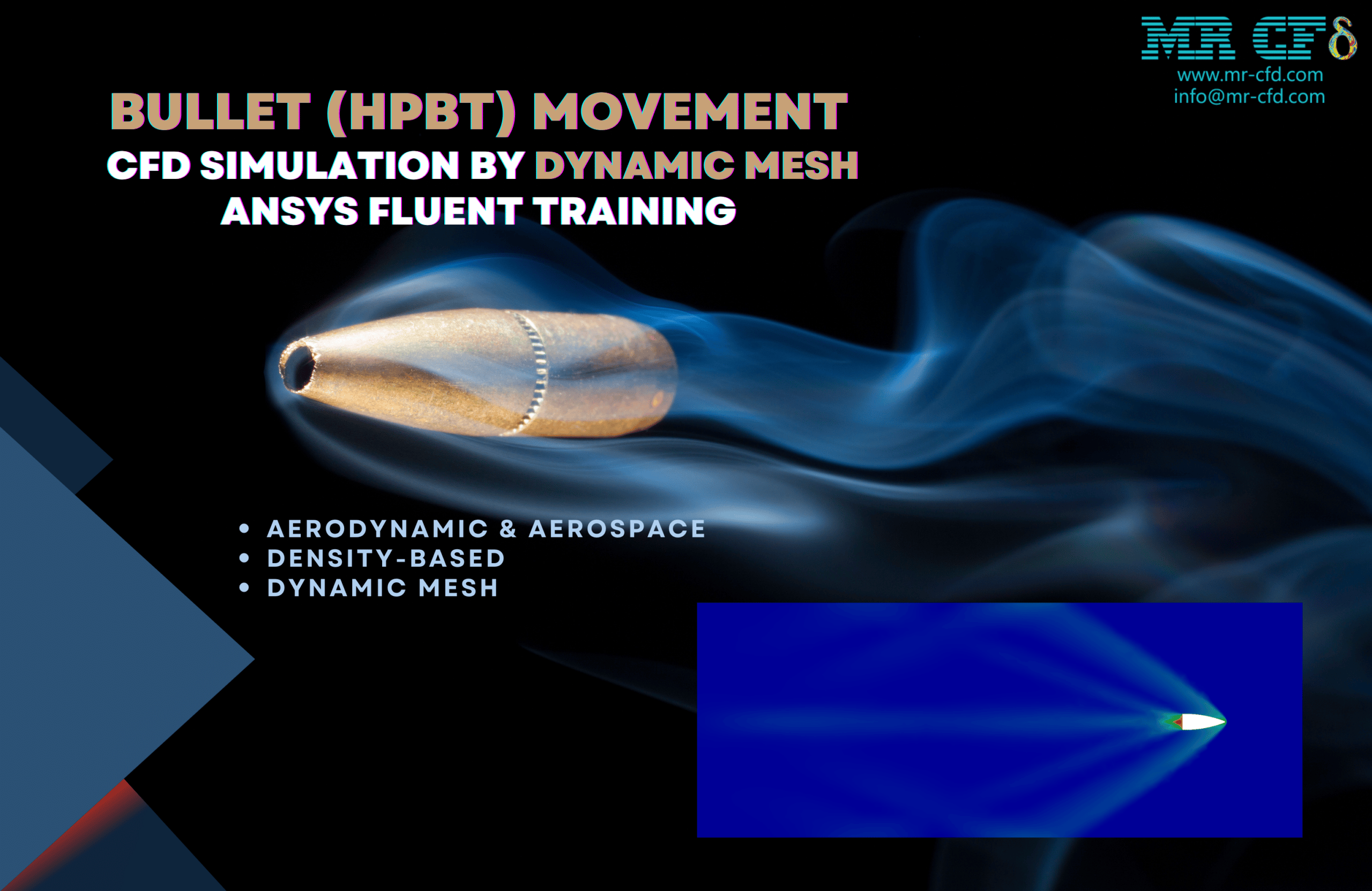
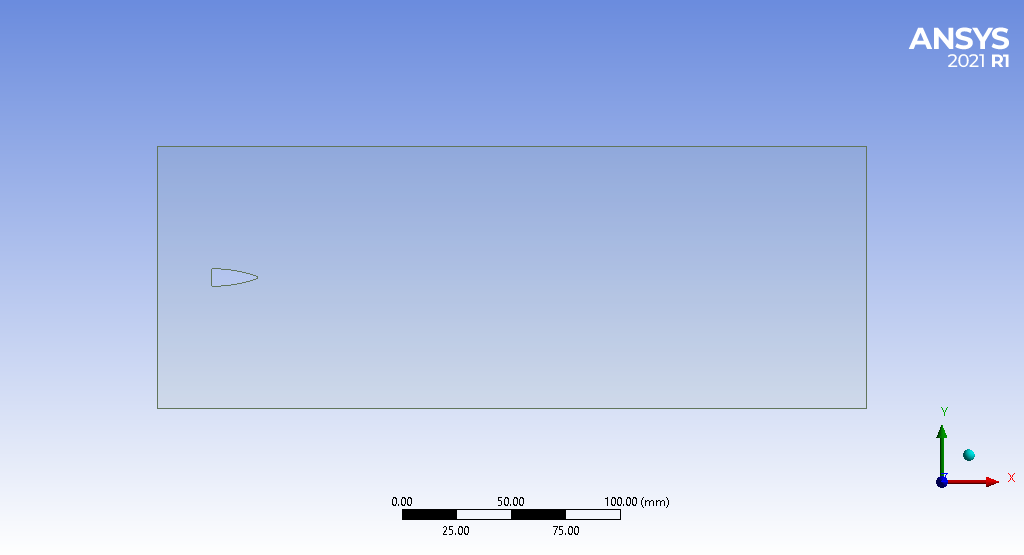
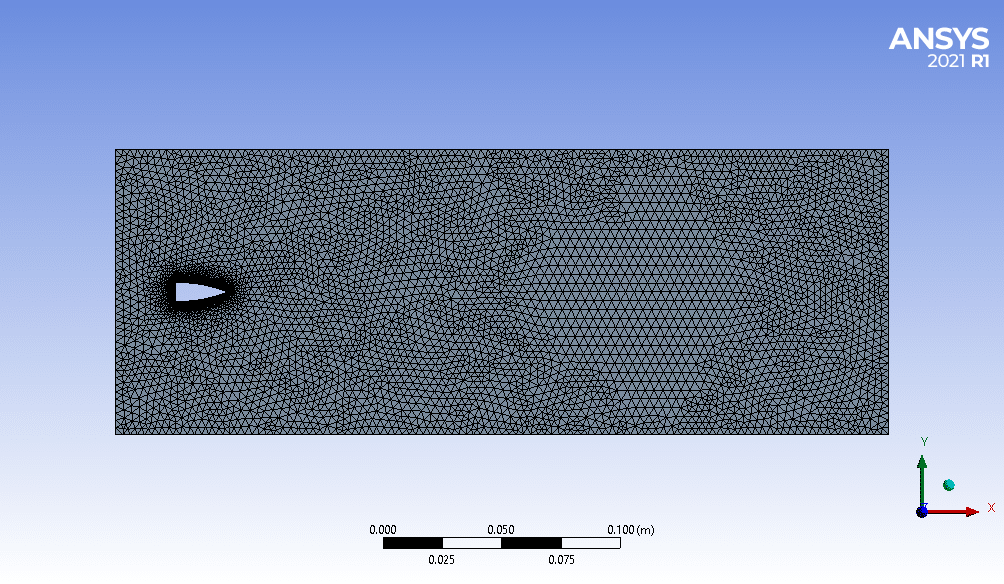
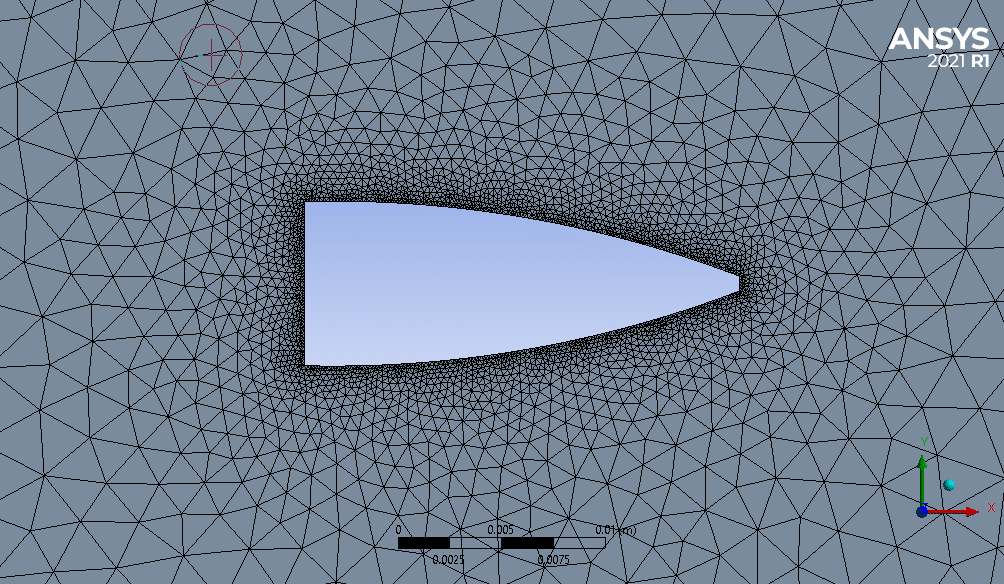

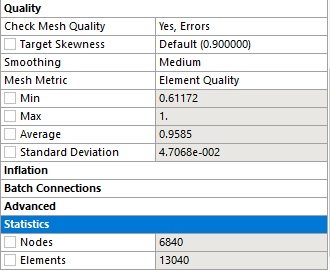



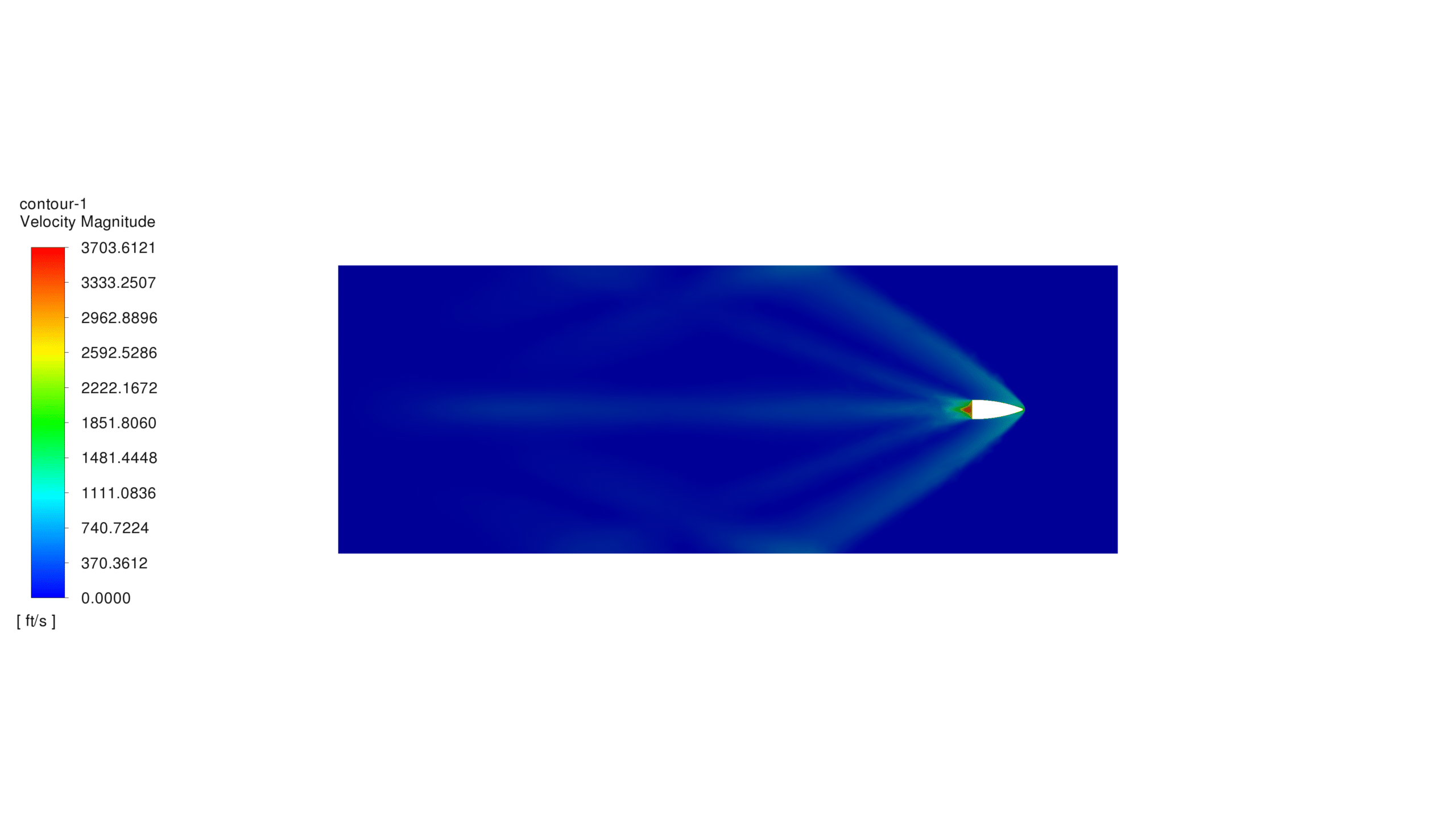

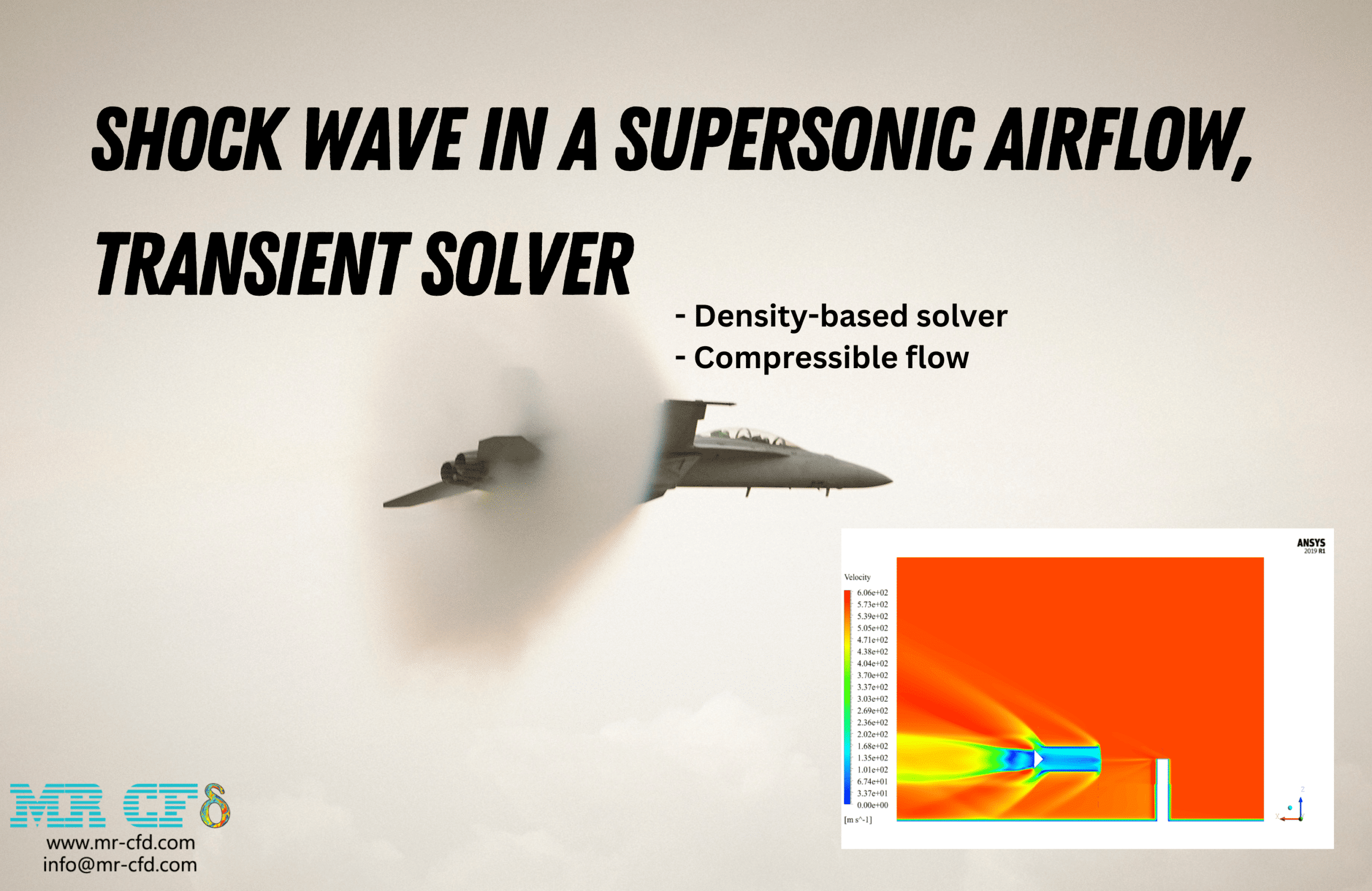
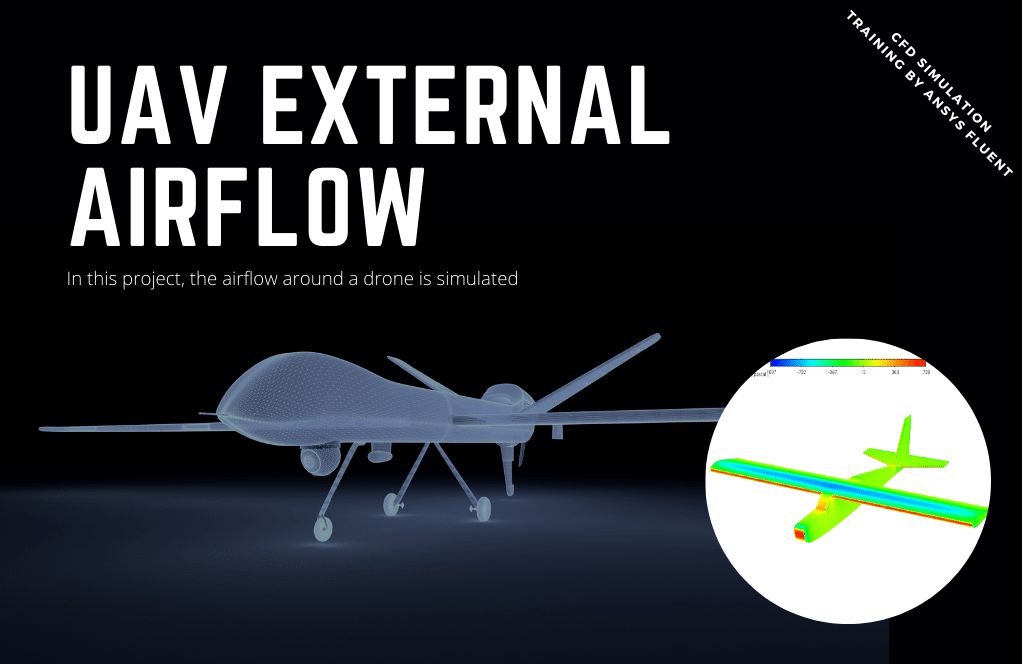
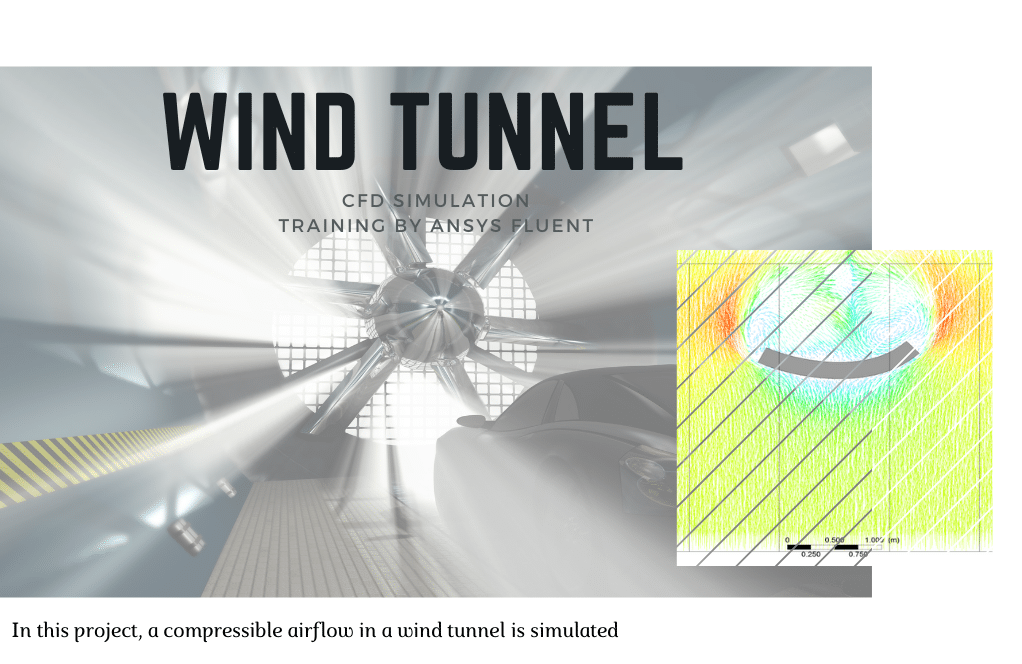
Luciano Larkin –
The description of how the air’s compressibility is modeled is interesting. Did the simulation take into account variable air densities at different altitudes or temperatures, or was it assumed to be constant?
MR CFD Support –
In this particular simulation, the air’s compressibility is modeled using the ideal gas law which accommodates the changes in air density with pressure, however, the simulation seems to maintain constant temperature conditions, suggesting that the effects of variable temperature or altitude on air density were not included in this model.
Finn Hudson –
Really impressed with how the bullet movement and dynamic mesh were handled. Fantastic visualization of the bullet breaking the sound barrier in CFD!
MR CFD Support –
Thank you for taking the time to review our Bullet (HPBT) movement CFD Simulation learning product. We’re thrilled to hear you appreciated the dynamic mesh and visualization of shockwave effects. Your feedback is much appreciated!
Vivian Rogahn –
The detail in the bullet’s CFD movement simulation is stunning—watching the shockwave formation behind the bullet is truly fascinating and showcases the power of dynamic mesh in ANSYS Fluent. Really a testament to the precise simulation capabilities for high-speed phenomena!
MR CFD Support –
Thank you for your appreciation! We’re thrilled to hear that you found the bullet movement simulation and the demonstration of the dynamic mesh capabilities in ANSYS Fluent impressive and insightful. It’s great to know that our product could vividly showcase high-speed fluid dynamics and shockwave phenomena.
Prof. Coty Will –
This training product seems immersive. Does it cover the adjustments made to mesh settings in scenarios where the bullet moves at different velocities or only the specified Mach 2.531?
MR CFD Support –
Glad to know you’re interested in our training! The training mainly focuses on the bullet movement at the specified velocity that corresponds to Mach 2.531. However, the fundamental concepts and step-by-step instructions provided will equip you with the knowledge to adjust mesh settings for different velocities as well, although specific scenarios other than stated may not be explicitly demonstrated.
Lulu Schulist Jr. –
I loved how detailed the training module was in showing the steps for setting up the mimicking of a moving bullet with dynamic mesh in ANSYS Fluent. Really appreciate how you displayed the phenomenon of shockwave when the bullet breaks the sound barrier. Great teaching tool!
MR CFD Support –
Thank you for your positive feedback! We’re thrilled to hear you found our training module on Bullet (HPBT) movement using Dynamic Mesh in ANSYS Fluent informative and valuable in demonstrating such complex phenomena. Your appreciation motivates us to keep providing high-quality learning material. If you have any more questions or need further assistance, please don’t hesitate to ask.
Madaline Greenfelder –
I’m curious how the dynamic mesh method manages to accurately track the movement of the bullet through the air. Could you elaborate on how the adaptation of the mesh works during high-speed projectile movement?
MR CFD Support –
The dynamic mesh method in ANSYS Fluent utilizes a combination of mesh smoothing and remeshing to accommodate the high-speed movement of the bullet through the air. Mesh smoothing adjusts the position of nodes in the mesh to maintain element quality without changing the connectivity, while remeshing introduces new nodes and alters the topology of the mesh to prevent excessive distortion. Such techniques ensure accurate capturing of the fluid-structure interactions and shock waves generated as the bullet moves at supersonic speeds, breaking the sound barrier.
Ms. Dariana Boyle –
I loved how the bullet’s hypersonic movement was simulated. Seeing the air pressure differences and shockwave patterns gave a great understanding of what happens at such high speeds. Great work on the visuals too!
MR CFD Support –
Thank you for your positive feedback on the Bullet (HPBT) Movement CFD Simulation by Dynamic Mesh in ANSYS Fluent! We’re thrilled to hear that the visuals and the simulation’s ability to demonstrate hypersonic movement were beneficial for your understanding. Your appreciation motivates us to keep delivering quality training materials and simulations. If you have any further questions or need more information about our CFD courses, don’t hesitate to reach out.
Jennings Maggio –
I was fascinated by how the bullet’s movement was simulated. Were the results and animations clearly presented so you could see the shockwave formation behind the bullet as it moved?
MR CFD Support –
Thank you for your enthusiasm about our simulation presentation! Indeed, the results and animations were consciously designed to showcase the details of the fluid dynamics at play. They clearly depicted the shock wave that forms as the bullet transitions past the speed of sound, along with the accompanying changes in pressure and velocity in the air behind the bullet, providing valuable insights into the high-speed aerodynamics of a bullet in flight.
Leora Auer –
I appreciated the detailed explanation on how the compressibility effect of air was modeled in the bullet movement simulation. The Dynamic Mesh approach showing the bullet in motion and the resulting shock wave graphics were particularly impressive.
MR CFD Support –
Thank you for your kind review! We are pleased to hear that the Dynamic Mesh model and its visualization of the bullet’s movement met your expectations and provided a clear and detailed analysis. If you have any further interest in our simulations or courses, feel free to reach out to us!
Willow Marquardt –
The description mentions the bullet moves at a velocity of 2850 ft/s. How does this specific velocity influence the shockwave formation in the simulation?
MR CFD Support –
The specified velocity of 2850 ft/s corresponds to a Mach number of approximately 2.531. At speeds greater than the speed of sound, the bullet is moving in the supersonic regime, which leads to the formation of shock waves. The shockwave is a sudden change in pressure, temperature, and density in the air surrounding the bullet, and it’s an important phenomenon observed in the simulation when dealing with high-speed projectiles like the HPBT bullet you mentioned.
Chance Jacobs –
I appreciate how the simulation captures bullet dynamic motion. How does the system ensure realistic dynamics in terms of the bullet’s shockwave and supersonic behavior?
MR CFD Support –
Thank you for acknowledging our work. The system ensures realistic bullet dynamics and supersonic behavior by using the Density-Based solver to account for air compressibility and employing the Dynamic Mesh model to adapt the mesh with the bullet’s motion. The ideal gas option for air density models the supersonic shockwave accurately due to the Mach number greater than one. This ensures that the shockwave patterns and the bullet movement align closely with real-world physics.
Patience Rosenbaum Sr. –
What benefits does it provide to use a dynamic mesh in this bullet movement simulation compared to using a stationary model?
MR CFD Support –
Using a dynamic mesh in this bullet movement simulation captures the complex interactions between the bullet and the changing air flow around it. It accurately models the deformations of the mesh due to the bullet’s movement at supersonic speeds, whereas a stationary model would not be able to replicate the transient effects and shock waves caused by the bullet’s motion.
Jason Turner –
The training material mentions ideal gas behavior; does this mean it also accounts for temperature changes due to adiabatic compression and expansion of air around the moving bullet?
MR CFD Support –
Yes, the simulation accounts for the changes in temperature due to adiabatic compression and expansion of the air. The ideal gas law is used under the assumption that air behaves as an ideal gas, which allows the simulation to capture the effect of changes in temperature and density as the bullet moves and interacts with the air.
Dr. Maximillian Boyer –
I’ve completed the Bullet (HPBT) movement CFD Simulation course and found it to be very insightful. The final results and animations were especially impressive as they gave me clear insight into the behavior of moving objects in a fluid domain. Great learning material!
MR CFD Support –
Thank you for your positive feedback on our Bullet (HPBT) movement CFD Simulation course! We’re thrilled to hear that you found our materials insightful and helpful for understanding dynamic mesh simulations. If you have any further questions or need assistance in future learning endeavors, please don’t hesitate to reach out to us.
Eleanora Bode –
The explanation for using the dynamic mesh model in this simulation is clear, but could you provide more understanding of how the bullet’s supersonic travel affects its surrounding air particles?
MR CFD Support –
In the case of supersonic bullet travel, the interaction with the surrounding air is quite significant due to the high speeds involved. As the bullet breaks the sound barrier, a shockwave is generated which causes abrupt changes in air pressure and temperature. The dynamic mesh allows for the simulation of these effects by adjusting the mesh around the bullet according to its movement and the interactions with the air, thus providing detailed insight into the phenomena like pressure waves, temperature gradients, and flow fields around the supersonic bullet.
Ms. Kelsie Conroy I –
The project description signals a highly detailed simulation setup, but could you elaborate on how the remeshing process handles the extremely high speeds of the bullet to ensure accuracy in the dynamic mesh?
MR CFD Support –
In the remeshing process, special attention is given to the region in front of and behind the moving bullet where the mesh quality can deteriorate due to high speeds. To ensure accuracy with the dynamic mesh, the simulation uses small time steps for remeshing, allowing a fine adjustment of the mesh to the bullet’s position and the pressure and temperature fields developing around it. Additionally, automatic remeshing criteria are applied that trigger the remeshing process whenever any user-specified mesh quality measurements, like skewness or aspect ratio, exceed threshold values. This continuous monitoring and adjusting maintain the mesh’s ability to capture critical flow features like shock waves that occur at supersonic speeds.
Denis Volkman –
I had a great experience during this CFD simulation on the bullet movement using Dynamic Mesh. The depiction of the shockwave phenomenon because of the supersonic speed was fascinating! The course content made me understand how to tackle the challenges of moving objects in fluid domains. Thanks, MR CFD Company for such insightful training.
MR CFD Support –
Thank you for your kind words! We’re delighted to hear you had a positive learning experience and that our simulation helped deepen your understanding of supersonic flows and moving objects. Your feedback is much appreciated, and it motivates us to continue delivering high-quality CFD training. If you have any more questions or need further assistance as you apply what you’ve learned, feel free say so.
Jennifer Koss –
I’m inspired by this dynamic modeling of a bullet in flight! Can you explain if the simulation takes into account the rotation of the bullet around its axis, like it would in reality after being fired?
MR CFD Support –
The movement simulation does take into account the external ballistics which involve yer and drag but does not specifically include the rotational motion or spin of the bullet about its axis which occurs due to rifling within the gun barrel. For a comprehensive analysis, including the effects of rifling and spin-stabilization would require additional modeling techniques possibly not covered in this simulation. However, the focus of this study is on capturing the high-speed dynamics and associated shockwave effects using Fluent’s Dynamic Mesh capabilities.